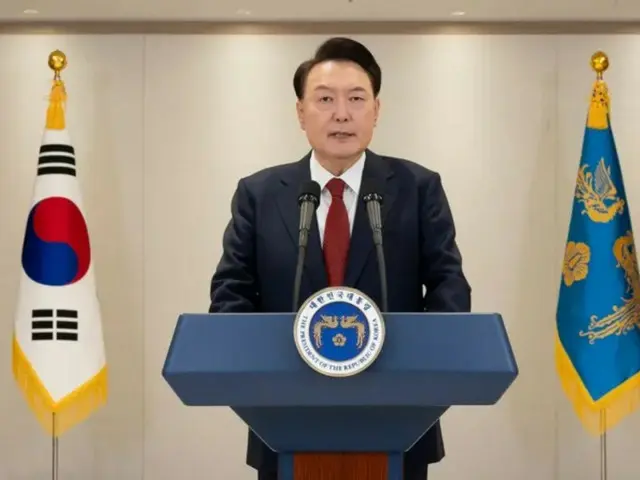However, the Presidential Security Service prevented this. For security reasons, the investigation headquarters decided not to execute the warrant that day. The arrest warrant is valid until today, the 6th, and the investigation authorities will investigate again.
Attention is focused on whether the execution will be carried out. Meanwhile, according to South Korean media, there are concerns that the execution may fail again, and there are also plans to request a more powerful arrest warrant.
Yoon declared "emergency martial law" late at night on the 3rd of last month. At the time, Yoon said that the reason for the declaration was to take advantage of the National Assembly, where the largest opposition party, the Democratic Party of Korea, holds a majority of seats.
The government explained that the declaration was made to "protect constitutional order," paralyzing national politics. It was the first time that martial law had been declared since democratization in 1987.
However, martial law can only be lifted if a majority of members of Congress request it, and the president must comply.
Immediately after the declaration, a plenary session of the National Assembly was held and all members in attendance voted in favor of lifting the state of emergency. Yoon lifted the state of emergency in just six hours. The opposition party argued that Yoon's declaration of state of emergency was a sign of civil unrest.
The joint investigation headquarters, consisting of the High Ranking Public Officials Investigation Agency (HPA) and other organizations, has launched an investigation. Article 87 of the Korean Criminal Code provides that if a person causes a riot with the intent of eliminating state power or violating the national constitution, he or she will be prosecuted.
The Constitution stipulates that if the president resigns, he will be punished as a crime of treason. The maximum penalty is the death penalty. Article 84 of the Korean Constitution stipulates that "The President shall not be subject to criminal prosecution while in office, except in cases where he has committed a crime of treason or foreign treason."
Although the incumbent president enjoys immunity from arrest, the crime of treason is an exception, so it is possible to arrest and indict Yoon. On the 3rd of this month, the Joint Investigation Headquarters filed a petition to the Presidential Office to execute an arrest warrant for Yoon.
They entered the residence. However, the Presidential Security Service blocked their entry in front of the building, and the standoff continued for more than five hours. In the end, the investigation headquarters gave up on the execution that day.
On the 4th, the government asked Deputy Prime Minister for Economy and Minister of Strategy and Finance Choi Sang-mok, who is acting for the president, to cooperate with the execution of the arrest warrant.
Choi requested that he take charge. Meanwhile, Yoon's side said that the Joint Investigation Headquarters' attempt to execute the arrest warrant was for special obstruction of public duties and causing injury, trespassing on a special building, and security at a military base or facility.
On the 5th, the government announced its intention to file criminal charges against 150 investigators from the investigation headquarters, citing suspicions of violation of the law. According to South Korean media, Yoon's side said, "The Public Prosecutors' Office does not have the authority to direct investigations over the police.
"Despite this, on the 3rd, he led a special police investigation team and attempted to execute an unconstitutional and illegal warrant against the president," he said. "They broke into the main gate of the military facility, which is a protected area, and prevented the execution of the illegal warrant.
"He assaulted security personnel who were trying to stop him, some of whom were injured," the statement said. Every day, rallies by both Yoon's supporters and those calling for the president's arrest have been held near the presidential residence.
Many people gathered on the 2nd, despite the heavy snowfall, and both sides raised their voices. South Korean media have unanimously criticized Yoon for not cooperating with the investigation. According to the South Korean newspaper Dong-A Ilbo, the ruling party's "People's
It is said that criticism has also been voiced from lawmakers in the party's "power-first" camp, and in a phone interview with the newspaper on the 3rd, Kim Sang-wook, a lawmaker from the party, said, "The president is not cooperating with the investigation and is cowardly hiding behind his insignificant legal knowledge.
"As president, I must keep my promise to undergo an investigation in an honest manner," he said. The South Korean newspaper Chosun Ilbo also said in an editorial on the 4th that the prolonged political turmoil in the country is causing a stir in the South Korean parliament.
"Major media outlets around the world, including CNN in the U.S. and BBC in the U.K., broadcast the chaos surrounding President Yoon's arrest in real time on the same day (the 3rd)," he said, adding, "We are concerned about the decline of the country's credibility in the world."
On the day of the emergency declaration, the Korean military's invasion of the National Assembly building was broadcast to the world in real time, and just as at that time, the credibility of the Korean nation must have been hit hard again.
If the credit rating goes down to 100%, it will be a big problem,” he said. The arrest warrant expires today, the 6th. The South Korean newspaper Hankyoreh said in an editorial on the 4th that “in a civil unrest situation, the masterminds of the civil unrest must be punished.
"This will never end. The future of the country depends on the conviction of Yoon Seok-yeol."
2025/01/06 15:14 KST
Copyrights(C)wowkorea.jp 5

